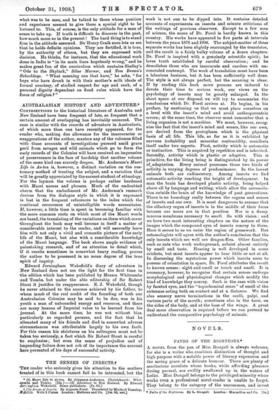AUSTRALASIA_N HISTORY AND .ADVENTURE.* 'CONTRIBUTIONS to the historical literature of
Australia and New Zealand have been frequent of late, so frequent that a certain amount of overlapping has inevitably occurred. The -case is similar with the records of adventure in Australasia, -of which more than one have recently appeared, for the treader who, making due allowance for the inaccuracies or -exaggerations of the author, masters any of the volumes filled with those accounts of investigations pursued amid grave peril from savages and wild animals which go to form the early records of the Colonies will have received an impression of perseverance in the face of hardship that another volume of the same kind can scarcely deepen. Mr. Anderson's Maori Life in ..4o-tea is, however, a distinct variation on the cus- tomary method of treating the subject, and a variation that -will be greatly appreciated by the earnest student of ethnology. ]?or the layman the volume is perhaps rather burdened with Maori names and phrases. Much of the undoubted charm that the embodiment of Mr. Anderson's research derives from the dialogue style in which it is expressed is lost in the frequent references to the index which the -continual recurrence of unintelligible words necessitates. If, however, a little time is spent in becoming familiar with the more common roots on which most of the Maori words -are based, the translating of the variations on them which occur -throughout the book may well become in itself a matter of -considerable interest to the reader, and will assuredly leave him with not only a vivid and romantic picture of the early life of the Maori, but also with a considerable knowledge of the Maori language. The book shows ample evidence of painstaking research, and of an attention to detail which, if it results sometimes in somewhat heavy reading, proves ,the author to be possessed in no mean degree of the true apirit of inquiry.
Edward Jerningham Wakefield's diary of adventure in New Zealand does not see the light for the first time in -the edition which has been published by Messrs. Whit,combe and Tombs, but under the able editorship of Sir Robert Stout it justifies its reappearance. E. J. Wakefield, though he never attained to the success achieved by his father, to whom much of the real credit of the founding of both our Australasian Colonies may be said to be due, was in his youth a man of unbounded energy and resource, and there -.are many lessons of Imperial value to be learned from his _journal. At the same time, he was not without bias, particularly as regarded persons, and the fact that he .alienated many of his friends and died in somewhat adverse -circumstances was attributable largely to his own fault. For this reason his strictures on his colleagues must not be -taken too seriously, a fact which Sir Robert Stout is careful -to emphasise ; but even the sense of prejudice and of impending failure does not rob of its importance the account .here presented of his days of successful activity.














































 Previous page
Previous page